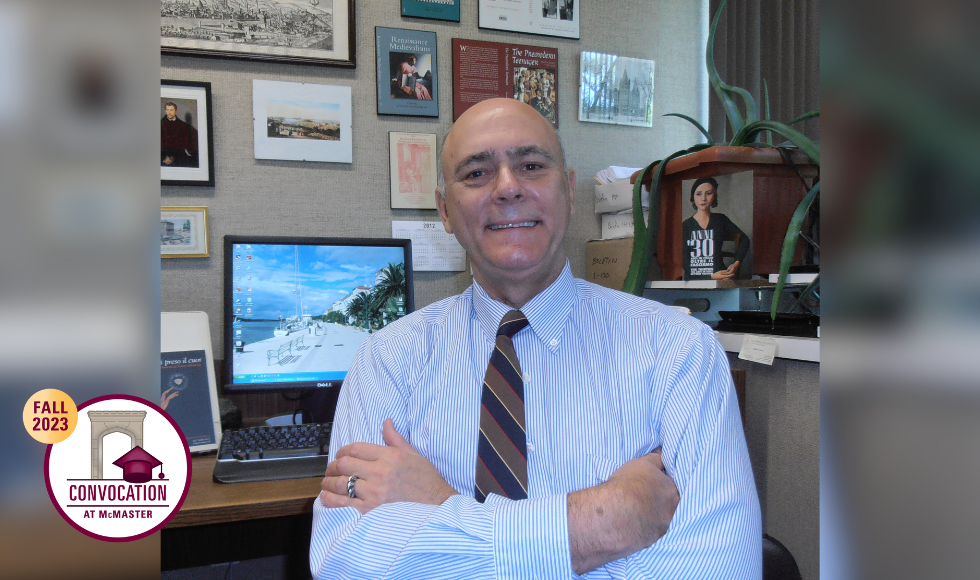From the Renaissance to the diasporic experience

Distinguished Alumni Award recipient Konrad Eisenbichler is known for his scholarship many facets of the Italian Renaissance, his literary translations, and his work documenting the experience of everyday Canadians. (Photo courtesy Konrad Eisenbichler)
Konrad Eisenbichler, of the McMaster Classes of ’73 and ’74, is part of one of the most decorated high school cohorts to come to this university.
When Eisenbichler receives the Distinguished Alumni Award at Fall Convocation on Nov. 23, he will join Westdale Secondary School and Mac grads screenwriter Len Blum ’75, former McGill University principal Heather Munroe-Blum ’74 and entertainer Martin Short ’72.
A career shaped by a multifaceted upbringing
Eisenbichler arrived in Canada in December 1961 from an island now called Lošinj in the Adriatic Sea, about equidistant from Venice and Zagreb. Now part of Croatia, at different points in its history the island has been part of Italy, Austria and the Venetian Republic.
“The island itself was basically Italian culture, but multi-ethnic, multi-lingual,” he says. That multifaceted culture and Eisenbichler’s experience as part of the worldwide diaspora have shaped his career for more than five decades.
When his family settled in West Hamilton in 1961, “I did not speak a word of English,” he recalls, but he learned fast to keep up at school.
“I was really wanting to go to university,” Eisenbichler says, but with money tight and only one university within walking distance, his choice was simple.
“I went to McMaster because of convenience, but very quickly realized that I was getting an excellent education.”
If I could do that, I can do this
After earning his undergraduate degree in French and Italian, Eisenbichler stayed at McMaster to complete his master’s degree in contemporary French theatre before migrating to the University of Toronto for his PhD.
The move to Toronto inspired him to change from French to Italian — and more.
“I switched centuries,” Eisenbichler recalls. “I’m very glad I did because I really enjoyed the Renaissance and the best way to be a Renaissance scholar is to be multidisciplinary. … I talk about history, literature, art.”
Eisenbichler found his doctoral work rewarding, but challenging. His McMaster experience came in handy at those times.
“When you do a PhD, you reach the point when you become very tired, cynical about everything and say, ‘I’m never going to finish this.’ When I was in those moments of insecurity, I would pull out my McMaster MA thesis and I would say, ‘If I was able to do this, I can do that as well.’
“On many occasions, that little bit of encouragement that I needed to finish my PhD came from the experience of writing the MA thesis at McMaster.”
From the Renaissance to the diasporic experience
In 1982, Eisenbichler joined the faculty in the University of Toronto’s Department of Italian Studies, where he remains today as a professor emeritus.
Best known for his interdisciplinary scholarship in sexuality, gender, history, religion and literature in the Italian Renaissance, his work in literary translation has garnered awards, including the International Literary Prize Umberto Saba and special recognition from the Italian government’s Committee for the Promotion of Italian Culture Abroad.
Eisenbichler’s scholarly work is also award-winning. His The Sword and the Pen: Women, Politics, and Poetry in Sixteenth-Century Siena won the prestigious Ennio Flaiano Prize for Italian Scholarship.
“I was with the Renaissance for most of my career,” Eisenbichler reports, “and then later … I started to become interested in Italians in Canada.”
That was part of his larger interest in the diasporic experience — an experience that he, of course, shares.
“The diasporic nature is something that is ingrained in so many of us Canadians,” he says. He launched a book series in 2022 in partnership with the Club Giuliano Dalmata di Toronto to document the memories and experiences of average people who have been disconnected from their homelands.
“My hope with that series is to bring to the attention of scholars the non-academic stories of diasporic people,” Eisenbichler says.
The Questions That Don’t Go Away
A fellow of the Royal Society of Canada since 2014, Eisenbichler continues to see immense value in the kind of research he has pursued since his student days at McMaster.
“You learn about something that is very far away from us today to get a sense of what was going on at that time and what were the crises, what were the questions that people were facing and how they resolved them. It’s a way of learning about being a human being,” he says.
There is particular value in this kind of scholarship as it relates to the timeless societal challenges.
“The big questions have always been there,” he observes. “The big questions don’t get resolved. The question of war. The question of peace. Those kinds of questions don’t go away.”
A half-century of pursuing and sharing that kind of knowledge has garnered Eisenbichler a wide range of accolades in Canada and beyond including membership in the Ateneo Veneto di Scienze, Lettere ed Arti (Venice); the Lifetime Achievement Award of the Canadian Society for Renaissance Studies; knighthood at the rank of Knight Commander in the Order of Merit of the Republic of Italy and appointment to the Order of Canada as the first Italian studies scholar to receive that honour.
The Distinguished Alumni Award brings him home to the city where he first made his life as part of the diaspora and to the university where he first set foot on his path of scholarship.


